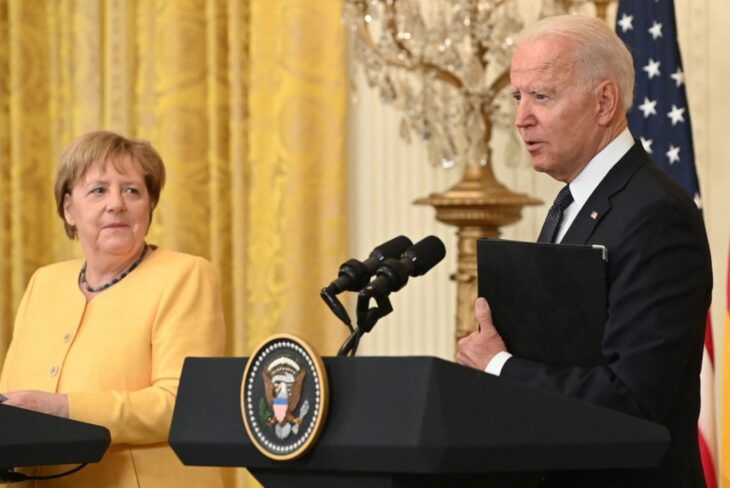Key components of pipeline accord will hinge on Russia, as well as backing from skeptical EU countries

A day after the U.S. and Germany announced a deal allowing the completion of the controversial Nord Stream 2 gas pipeline, top officials conceded that neither the White House nor the Chancellery have the authority to implement some of its most crucial components.
As a huge outcry went up from opponents of the Russia-led pipeline project, Chancellor Angela Merkel acknowledged that her agreement with President Joe Biden hardly settled their political disagreements, and that much remained uncertain.
“The agreement with the U.S. government does not cement the differences, but it does not overcome all differences either,” Merkel said at a news conference. “The differences remain.” Of the deal, she added: “It is an attempt between the U.S. government and us to set certain conditions that also have to be implemented.
“I am glad that we have succeeded so far,” Merkel continued. “And we also have a lot of tasks ahead.”
Those tasks are hardly small and include overcoming fierce opposition from some members of the United States Congress, persuading some extremely dubious EU countries to get on board, and convincing Russia to liberalize its energy sector, divest itself of the €9.5 billion pipeline, and pay Ukraine some additional €20 billion through 2034 to make up for the loss of gas transit fees — which the new pipeline would effectively render unnecessary.
While some influential Germans — notably former chancellor and current Nord Stream 2 chairman of the board Gerhard Schröder — have been instrumental in securing the pipeline’s completion, Berlin may have little to no influence over Moscow once construction is done and gas is flowing.
U.S. Senator Jeanne Shaheen, a Democrat on the foreign relations committee who co-authored U.S. sanctions legislation targeting the pipeline, said she was “skeptical” of the deal given that “the key player at the table — Russia — refuses to play by the rules.”
Unhappy Kyiv
Perhaps the biggest obstacle will be political and legal challenges by the Ukrainian government, which made clear that it has no intention of surrendering to the whims of Berlin and Washington.
On Thursday, the European Commission — which officially opposes the Nord Stream 2 project but has reiterated that without a clear violation of EU law, it is powerless to stop it — was left struggling to explain why the U.S. and Germany, just one of the bloc’s 27 member countries, were suddenly in the business of setting energy policy for the entire EU.
Awkwardly, that explanation began with a restatement of the Commission’s position that Nord Stream 2 is generally a bad idea.
“As you know, as we have said before, Nord Stream is not a project of common European interest,” said Tim McPhie, a Commission spokesman for climate and energy policy.
“Nevertheless,” McPhie continued, “the Commission’s objective has always been to ensure that Nord Stream 2, if built, should operate in a transparent and non-discriminatory way, with the appropriate degree of regulatory oversight and in line with international and EU energy law.”
Then, perhaps trying to convince the Commission itself, he added: “Implementing the EU’s energy policy is a matter for the EU and its member states.”
Except, apparently, when it’s a matter for Biden, Merkel and Russian President Vladimir Putin.
Merkel, for her part, insisted that Germany was committed to making sure that “Ukraine remains a transit country and that energy cannot be used to put Ukraine in a difficult situation.”
However, given Ukraine’s geography, it will inevitably remain in a difficult situation.
McPhie, the Commission spokesman, said Brussels was glad to hear that Germany intended to comply with EU energy law as part of its deal with Washington.
“The Commission takes note of the statement by the governments of Germany and the United States and welcomes the strong commitment of Germany to abide by both the letter and the spirit of the Third Energy Package with respect to Nord Stream 2,” he said.
What remains to be seen is whether the Commission will have the courage to object should Germany’s energy regulator give the pipeline permission to operate without full compliance with EU gas regulations — a concern often repeated by German members of the European Parliament’s Green group.
Klaus-Dieter Borchardt, former deputy director-general of the Commission’s energy department, said in 2019 that Brussels shouldn’t accept any technical workarounds — but the Commission’s decision to intervene is not technically required.
Another question is to what extent Brussels and Berlin are now legally bound to assess regulatory approval for Nord Stream 2 in the context of Ukraine’s existing pipelines. On Wednesday, Kyiv invoked a provision in its political association agreement with the EU, which requires consultations on energy infrastructure taking into account existing pipelines, security of supply and energy concerns.
On Thursday, the Commission said it had not yet received an official request on the matter from Ukrainian Foreign Minister Dmytro Kuleba.
Ukrainian officials said the formal written request had indeed been sent to Brussels, as well as delivered to the EU representation in Kyiv.
Dana Spinant, the Commission’s deputy chief spokeswoman, insisted that there would be an additional discussion among member countries about the U.S.-Germany deal.
“We shall have a closer look at the details of this political agreement announced yesterday,” Spinant said. And she brushed off a question about provisions in the agreement that seem to call on the EU to provide financial assistance to Ukraine — noting that such disbursements would have to be approved through the EU’s normal budget process.
“Any contribution which the European Union might make to Ukraine,” she said, “will be discussed with member states.”



